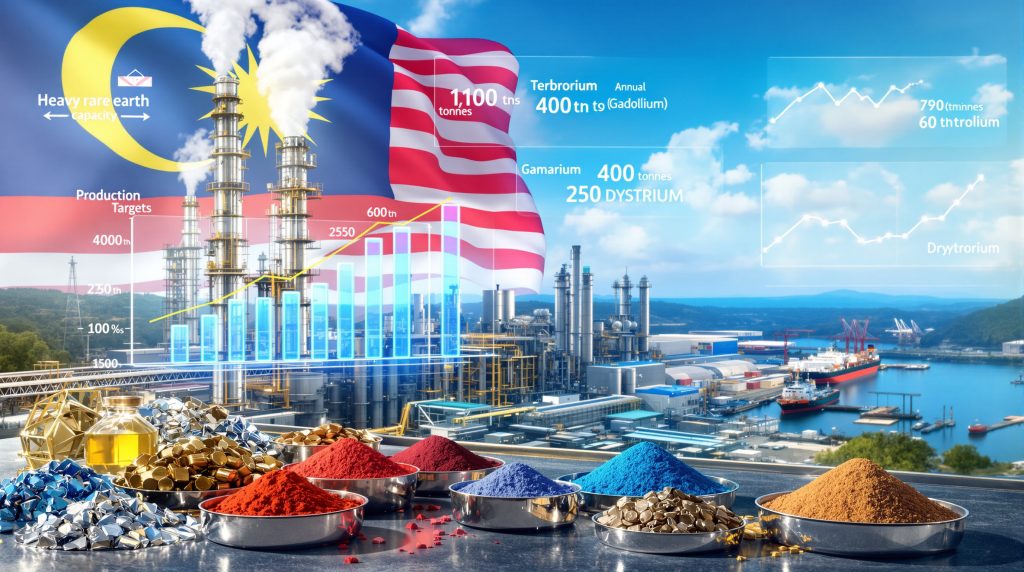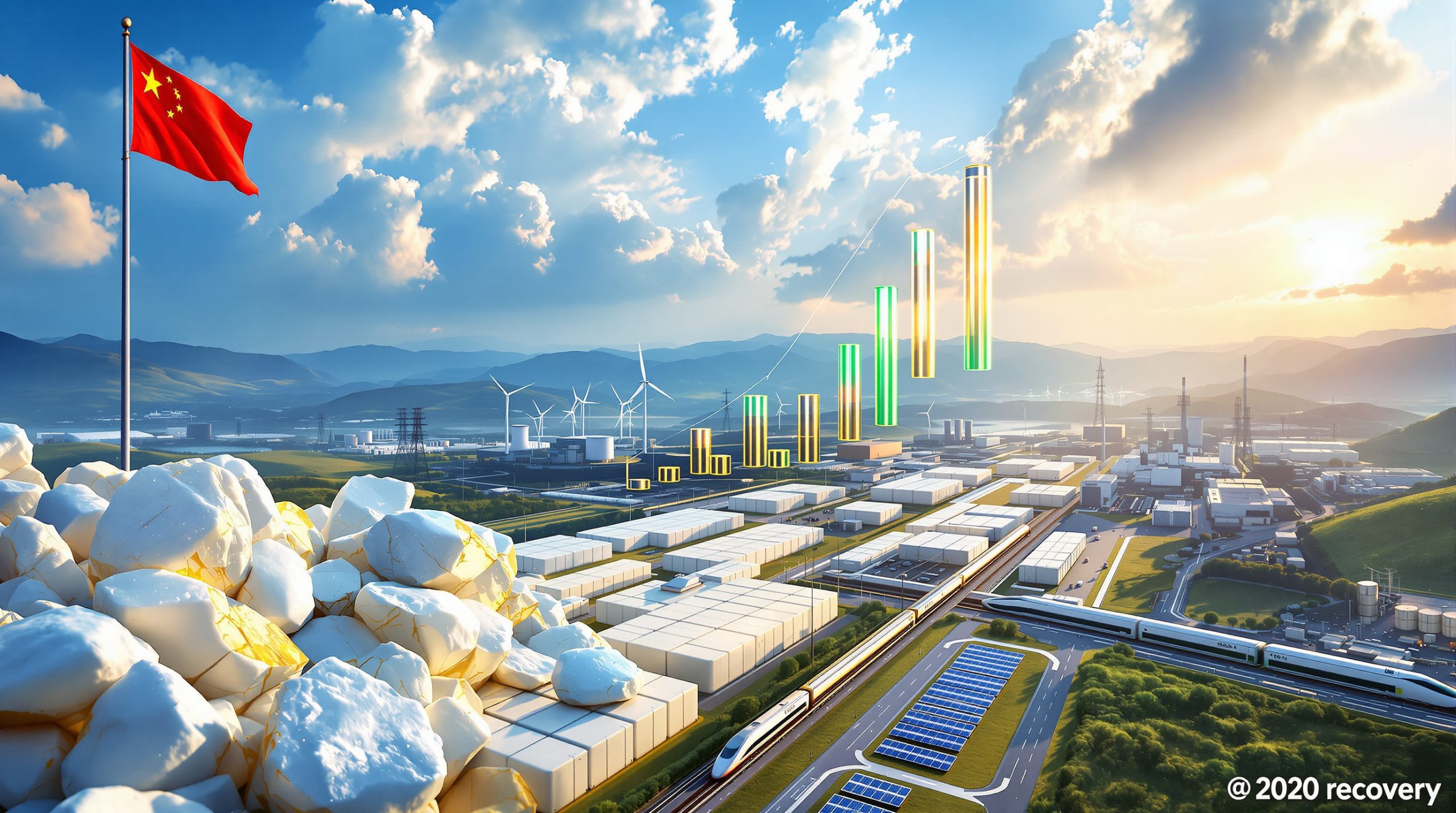Strategic Expansion Beyond China's Dominance
The global rare earth elements market confronts a critical vulnerability: excessive concentration of processing capabilities within a single nation. Lynas Rare Earths' announcement of a $180 million investment to establish a dedicated heavy rare earth processing facility in Malaysia represents a strategic pivot toward supply chain diversification.
This facility addresses mounting international concerns about dependency on Chinese processing infrastructure, which currently handles the vast majority of global rare earth separation and refinement operations. The Lynas rare earths processing facility in Malaysia positions itself as a cornerstone alternative for customers seeking reliable supply sources outside traditional Chinese channels.
According to company leadership, the facility specifically targets strong market demand for dependable non-Chinese sourcing options. CEO Amanda Lacaze emphasized that this development forms a key element of Lynas' strategic growth framework, enabling the company to exercise greater selectivity regarding customer relationships and pricing structures.
Understanding Heavy Rare Earth Elements and Their Critical Applications
Heavy rare earth elements occupy a unique position within the materials science landscape due to their scarcity and irreplaceable functionality in advanced technological applications. Unlike their lighter counterparts, which find broader industrial usage, heavy rare earths serve highly specialised roles that cannot be easily substituted.
Essential Heavy Rare Earth Applications Include:
-
Dysprosium: Fundamental for manufacturing high-performance permanent magnets used in wind turbine generators and electric vehicle drive motors
-
Terbium: Critical component in green phosphor production for LED lighting systems and advanced display technologies
-
Gadolinium: Essential for medical MRI contrast agents and specialised neutron capture applications
-
Yttrium: Vital for laser crystal manufacturing and superconductor material development
-
Samarium: Required for specialised permanent magnet applications and nuclear reactor control systems
-
Lutetium: Utilised in PET scan detector systems and advanced research applications
The concentration of these elements in economically viable geological deposits remains extremely limited globally, making processing infrastructure strategically valuable for national security and technological advancement. Furthermore, understanding these applications provides crucial context for critical minerals energy security initiatives worldwide.
Production Capacity and Technical Specifications
The Lynas rare earths processing facility in Malaysia will establish processing capabilities for approximately 5,000 tonnes of heavy rare earth feedstock annually, sourced primarily from the company's Mt Weld deposit in Western Australia. This substantial capacity targets specific market segments with defined production goals.
| Element | Annual Production Target | Strategic Applications |
|---|---|---|
| Samarium | 1,100 tonnes | Permanent magnets, nuclear applications |
| Yttrium | 1,100 tonnes | Laser systems, phosphors |
| Gadolinium | 400 tonnes | Medical imaging, neutron capture |
| Dysprosium | 250 tonnes | High-temperature magnets |
| Terbium | 50 tonnes | Green phosphors, magneto-optical devices |
| Lutetium | 10 tonnes | PET scan detectors, research applications |
Future expansion phases may incorporate additional elements including europium, holmium, ytterbium, and erbium, depending on market evolution and technological advancement requirements. The facility design accommodates potential integration of Malaysian ionic clay deposits as alternative feedstock sources.
Regulatory Framework and Compliance Requirements
Establishing heavy rare earth processing operations requires navigation of complex environmental and regulatory landscapes. Malaysian industrial policies have evolved to encourage downstream processing whilst maintaining stringent environmental protection standards.
Construction of the facility remains subject to several regulatory approvals before work can commence. These regulatory requirements encompass multiple dimensions of industrial operations:
Key Regulatory Considerations:
-
Environmental impact assessments for chemical processing operations
-
Waste management protocols for radioactive materials handling
-
International trade compliance for strategic materials export
-
Local content requirements and technology transfer obligations
-
Occupational health and safety standards for rare earth processing
Malaysia's recent policy developments restricting raw rare earth exports align strategically with Lynas' processing expansion, creating synergies between corporate objectives and national industrial development goals. Additionally, similar regulatory frameworks are being developed through European CRM facility insights to enhance regional supply chain resilience.
What Are the Environmental Implications?
The facility will implement advanced environmental management systems to minimise ecological impact whilst ensuring regulatory compliance. However, rare earth processing inherently involves handling of low-level radioactive materials and chemical separation processes that require careful monitoring.
Environmental management protocols include comprehensive waste water treatment systems, air emission controls, and solid waste management procedures specifically designed for rare earth processing operations.
Addressing Global Supply Chain Vulnerability
Western governments increasingly recognise rare earth supply concentration as a fundamental national security concern. The Lynas rare earths processing facility in Malaysia directly addresses these concerns through strategic geographic diversification.
Supply Chain Security Benefits:
-
Geographic Diversification: Reducing dependence on single-nation processing infrastructure
-
Supply Route Alternatives: Creating multiple pathways for critical material acquisition
-
Strategic Redundancy: Establishing backup capacity for essential technology supply chains
-
Market Leverage: Enabling selective customer targeting based on strategic considerations
Company leadership indicates that existing offtake agreements have already been secured for dysprosium and terbium production, with additional contract negotiations planned for 2025. This pre-commitment approach demonstrates strong market confidence in alternative supply arrangements.
In addition, this development complements broader initiatives including the Australian strategic reserve programme and evolving mining industry innovation across the sector.
Economic Impact and Value Creation
The $180 million investment generates multiple economic benefits across regional and international value chains. The facility's development creates both immediate construction opportunities and long-term operational employment.
Direct Economic Effects:
-
Construction employment during the 24-month build phase
-
Permanent operational positions requiring specialised technical expertise
-
Technology transfer opportunities to local engineering service providers
-
Advanced manufacturing skills development within the regional workforce
Broader Economic Implications:
-
Downstream manufacturing opportunities for rare earth-dependent industries
-
Research collaboration partnerships with Malaysian educational institutions
-
Export revenue generation from high-value processed materials
-
Integration with existing chemical processing industrial clusters
How Will This Impact Regional Development?
The facility's location within the Gebeng Industrial Estate leverages existing infrastructure whilst contributing to Malaysia's broader industrialisation objectives. Consequently, the development is expected to attract additional downstream processing investments and technology partnerships.
Production Timeline and Capacity Development
Lynas has established a phased production approach designed to minimise market disruption whilst optimising operational efficiency. This systematic rollout enables progressive capacity building and customer relationship development.
Implementation Schedule:
Phase 1 (April 2026): Initial samarium production from Mt Weld concentrate processing
Phase 2 (2026-2027): Progressive capacity expansion across all targeted elements
Phase 3 (2027+): Achievement of full nameplate capacity with potential ionic clay feedstock integration
CEO Amanda Lacaze emphasised the company's demonstrated ability to execute rapid development timelines, stating that "samarium production by April 2026 further demonstrates the organisation's capacity to move efficiently in alignment with customer requirements".
According to Lynas Rare Earths' official website, the company has established a proven track record of delivering complex processing facilities on schedule and within budget parameters.
Malaysian Policy Support and Strategic Advantages
Malaysia's positioning within the rare earth value chain reflects deliberate policy choices designed to maximise economic value extraction from mineral resources. The government's strategic approach encourages local processing whilst supporting export competitiveness.
Policy Framework Benefits:
-
Export restrictions on unprocessed rare earth materials encourage domestic value addition
-
Industrial estate infrastructure supports complex chemical processing operations
-
Workforce development programmes align with advanced manufacturing requirements
-
Trade agreements facilitate processed material exports to key international markets
The Gebeng Industrial Estate location provides multiple operational advantages including deep-water port access, established chemical processing expertise, and proximity to Asian manufacturing centres. Moreover, this strategic positioning enhances the global mining landscape by establishing Malaysia as a critical processing hub.
What Makes Malaysia an Ideal Location?
Malaysia offers several unique advantages for rare earth processing operations, including established industrial infrastructure, skilled workforce availability, and supportive regulatory frameworks. Furthermore, the country's geographical position provides optimal access to both raw material sources and end-user markets.
The existing chemical processing expertise within the Gebeng Industrial Estate creates operational synergies and reduces infrastructure development costs significantly.
Future Expansion Opportunities and Strategic Development
Beyond immediate heavy rare earth processing capabilities, several expansion pathways could enhance the facility's strategic value and market positioning.
Potential Development Areas:
-
Integration of Malaysian ionic clay deposits as diversified feedstock sources
-
Downstream manufacturing partnerships for rare earth-dependent product development
-
Research and development facilities focused on processing technology advancement
-
Strategic material stockpiling and international trading operations
-
Collaboration with technology companies requiring secure rare earth supplies
These expansion opportunities align with broader industry trends toward vertical integration and supply chain control. Additionally, Mining.com reports that the facility represents part of Lynas' broader strategy to establish comprehensive processing capabilities outside China.
Global Market Impact and Competitive Dynamics
The facility's operational commencement will fundamentally alter global heavy rare earth supply dynamics by introducing meaningful competition to existing processing concentration. This development creates opportunities for improved price discovery and supply security.
Market Transformation Effects:
-
Enhanced price competition through alternative supply source availability
-
Supply security improvement for technology manufacturers globally
-
Investment attraction to rare earth exploration and development projects
-
Geopolitical risk reduction for industries dependent on critical materials
-
Strategic leverage for allied nations seeking supply chain resilience
The facility represents a paradigm shift toward supply chain diversification in critical materials sectors, potentially establishing precedents for similar developments across other strategic mineral categories.
How Will This Affect Global Pricing?
The introduction of significant non-Chinese processing capacity is expected to create more competitive pricing dynamics and reduce price volatility associated with single-source dependency. However, the impact will vary across different rare earth elements based on supply-demand fundamentals.
Strategic Positioning for Critical Material Security
The Lynas rare earths processing facility in Malaysia constitutes more than industrial expansion; it represents a comprehensive response to global supply chain vulnerabilities in critical materials. The facility's processing capabilities, strategic location, and market positioning address fundamental concerns about rare earth supply security whilst generating substantial economic value.
This investment demonstrates how private sector initiatives can align with national strategic interests to address global resource security challenges. The facility's development may serve as a model for similar initiatives across other critical material sectors, contributing to broader supply chain resilience objectives.
The systematic approach to capacity building, regulatory compliance, and market development positions the facility as a cornerstone of alternative rare earth processing infrastructure outside traditional supply arrangements.
Disclaimer: This analysis includes forward-looking statements regarding production timelines, market impacts, and strategic developments. Actual results may vary based on regulatory approvals, market conditions, and operational execution. Investment decisions should consider multiple factors including geopolitical risks, commodity price volatility, and technological changes affecting rare earth demand.
Looking to Capitalise on Critical Minerals Investment Opportunities?
Discovery Alert's proprietary Discovery IQ model delivers instant notifications about significant ASX mineral discoveries, including critical minerals developments that could reshape global supply chains. Start your 30-day free trial today and position yourself ahead of market movements in this strategically vital sector by exploring Discovery Alert's comprehensive service.




